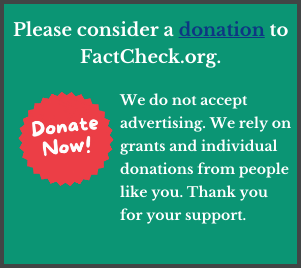During my time at FactCheck.org, I’ve saved a lot of emails and more than a few handwritten notes from grateful readers. I’ve taped some of those notes to the bookcase above my desk.
“Thank you for researching facts,” one says. “The truth matters!”
Another one says, “Thank you for all you do reporting the facts! A free press is the front line of democracy.”
And this one from 2012: “Thank you for saving my sanity during the election cycle & always!”
These are my daily reminders of what an honor and privilege it is to work at FactCheck.org.
After more than 14 years here, including the last 12 years as the director, I’ve taken down the handwritten notes and started to clean out my office. I’m retiring at the end of this year.

I’ve been in journalism for more than 40 years – mostly at newspapers, primarily writing or editing stories about politics and public policy.
And there is nothing I would rather spend a lifetime doing.
I never thought twice about what I would be when I grew up. I got the bug early – writing a mock newspaper about family news as a kid, working on the high school newspaper as a teen, taking a part-time job at a local newspaper as a college student and getting my first full-time job at a daily paper shortly after I graduated with a dual major in journalism and English.
It’s such a rewarding profession. They pay you for reading, writing and talking to people. They pay you for telling the truth. How cool is that? You literally learn something new every day. It’s like a continuing education course for life.
It has not been an easy time to be in journalism. I’ve lived through the near-collapse of print journalism and the rise of cable TV talking heads. Since coming to FactCheck.org, I’ve witnessed the increasing influence of the internet and experienced the rising wrath of partisans.
The 24/7 news cycle is now filled with people with opinions, and social media is awash in misinformation and disinformation.
But this challenging landscape for news organizations makes fact-checking all the more important.
Fact-checking provides a life raft for people, like our appreciative readers, who are eager to seek out the facts. They want the kind of straight reports that the late Washington Post columnist David Broder envisioned in 1990 in his column, “Five Ways to Put Some Sanity Back in Elections.”
Broder, once the “dean” of the Washington press, called on news organizations to conduct an “investigation” of political ads and hold politicians accountable for their political messaging.
“We need to … demand the supporting evidence from the candidate airing the ad, get rebuttal information from his opponent and then investigate the situation enough ourselves that we can tell the reader what is factual and what is destructive fiction,” Broder wrote. “And we ought not to be squeamish about saying in plain language when we catch a candidate lying, exaggerating or distorting the facts.”

That is exactly what we have been doing at FactCheck.org for more than two decades, dating to 2003. We started out with TV ads and political speech, and we’ve expanded over the years to include debunking health and science distortions in 2015 and social media misinformation in 2016.
I’m proud of what we’ve built here at FactCheck.org and how we operate.
I’m proud of my colleagues – who are honest, hardworking and, as one reader put it, dedicated to “ferreting out truth from fiction.”
It is a pleasure to work every day with such talented journalists who are so committed to getting the facts right and presenting them accurately, even to the point of agonizing over the right word or phrase to be as precise as possible.
I’m proud of the transparent process we have at FactCheck.org that treats both sides equally, avoids selection bias and false equivalency, and subjects each article to multiple edits. We review claims made by Republicans and Democrats in the same venues – TV interviews, major speeches, TV ads – and then apply the same standards to both sides. In the end, we let the chips fall where they may.
All of our articles are fact-checked, and we provide hyperlinks for readers to access the same data, reports and other documents that we used to draw our conclusions. Some skeptical readers or critics will ask: “Who fact-checks the fact-checkers?” The answer is: You. Just click on the links we provide in each story.
We write in neutral language, too, because as I like to tell readers: We are here to inform, not inflame.
I know there are critics of fact-checking. I’ve heard from plenty of them – often in language that can’t be repeated here. But we don’t write for politicians or partisans who want to use fact-checking as a political weapon in their never-ending war against the other side.
We are here for the open-minded, curious readers who want to be good citizens and know “what is factual and what is destructive fiction,” to quote Broder. We are here for you.
Any fair-minded reading of our work over a period of time will show that we treat both sides the same.
And that will continue next year under Lori Robertson, who will become the third FactCheck.org director.
Lori, who has been at FactCheck.org since 2007, is currently our managing editor. She’s our moral compass. She has high standards for ethics, transparency and accuracy, having spent nine years covering the media as an editor and writer for American Journalism Review.
Robert Farley, who is currently our deputy managing editor, will become deputy director. Rob joined us in 2011 from PolitiFact, where he was part of the team that won the 2009 Pulitzer Prize for National Reporting. He enjoys playing devil’s advocate.
So, I leave you in the very best of hands. And thanks one more time for all your support – the donations, the sincere notes of gratitude and, most of all, reading FactCheck.org.
Editor’s note: FactCheck.org does not accept advertising. We rely on grants and individual donations from people like you. Please consider a donation. Credit card donations may be made through our “Donate” page. If you prefer to give by check, send to: FactCheck.org, Annenberg Public Policy Center, P.O. Box 58100, Philadelphia, PA 19102.